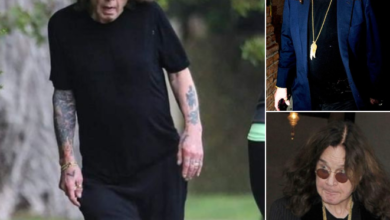Helen Mirren, 76-years-old, details why she hates the term ‘anti-aging’

To me, Helen Mirren is the very definition of grace. The popular British actress who is known for her role in major films over the past few decades, from “Caligula” to “The Queen.”
The iconic star turned 76 this past summer, but she revealed why she hates constantly feeling scrutinized for her age and appearance.

Dame Helen Mirren has always been beautiful, age has never affected her.
According to many, she’s truly a timeless woman.
The London-born 76-year-old is particularly well-known for portraying Queen Elizabeth II in the 2006 film The Queen, earning her an Academy Award for Best Actress. But Mirren has several other awards under her belt and is widely known for her versatility as an actress.
Over the years, she has portrayed a wide range of characters, including both dramatic and comedic roles.

But she’s not only famous because of her appearances on the silver screen.
The award-winning actress has always made her views on the double standard for women in her industry clear. A vocal advocate against many injustices, her age has brought only further rallying against the many ways these prejudices are presented.
In fact, in a 2019 interview with Grazi, the star explained in detail why she hates terms like “anti-aging” and “beauty.” Feeling her generation in particular has been victimized by terms like this, she explained:
“How can a product be ‘anti-ageing’? That’s like saying, ‘I’m anti-sun.’ Well, the sun is going to rise. ‘Well no, I’m anti it.’”
Aging is a natural process and one that we all experience. Yet society seems obsessed with the idea of looking as youthful as possible.

There are countless creams and serums that promote a “healthier, younger” version of ourselves and wellness classes to keep us as fit as people 20 years our junior. But when it comes to embracing our true age, few seem interested.
According to Mirren, the natural act of aging should not be a cause for exclusion or shame.
“It’s extremely annoying to women of my generation and others following mine to have beauty products sold on a 15-year-old face,” she added.
Taking it a step further, the actress also explained clearly why she does not like the use of the word “beauty,” either.

She said:
“They’ll think: ‘Well, I’m not beautiful. It’s all very well for all these beautiful women, but I don’t feel beautiful.’
“I don’t want to exclude these people from feeling fabulous about themselves.”
It can be hard to accept growing older, but seeing others accept and love beauty at all ages does make it easier.
A brand ambassador for L’Oréal, Mirren explained how she would like to find ways to replace words like this, such as swapping the idea of “beauty” with “being,” a term that can apply to all. For example, she said, “I’m a being that wants to wear red hair…”

Dame Mirren, in another interview with The Cut, addressed the term again in relation to the company she represents.
“With each era, it’s the start of something new, so I absolutely believe in beauty products for all ages, and all skin types, but I don’t like the word ‘anti-aging’,” she said. “I think it’s demeaning, actually. L’Oréal doesn’t use the term and I appreciate it.”
The being said, Mirren does acknowledge in the interview that it is of course lovely when people take care of themselves. Cautioning that vanity is a “vice,” she goes on to explain that:
“It’s not vain to wash your hair and then brush dry it and put products into it, or to put makeup on.”
Mirren hasn’t had long hair for decades, but now she’s trying it out.
“I thought, do you know what, it’s pretty cool, I think I’ll stick with it for a little while. It will come off eventually…but I’m kind of enjoying it, it’s quite radical,” the actress said.

Dame Mirren also claims that she has yet to actually experience the issue of vanity in person. She said:
“I don’t think I’ve ever met anyone vain, actually. I think people can get obsessed with their own looks in this world of social media, but I suspect that really mostly comes from a sense of insecurity more than self-love.”
The actress has seen some hope in these areas, as well. She told Grazia that she saw a “rising consciousness” among young people through their interactions on social media. This, according to the star, will make current young people one of the most important generations to date.
“They are coming into womanhood with the consciousness of the #MeToo movement,” she explained, “With the consciousness of feminism being, again, an accepted and celebrated word.”

We live in a beauty-obsessed world where women and girls are told that they should be slim, tall, symmetrical, and have flawless skin.
But Helen continuously defies beauty stereotypes with her presence and she has taken the fight for many years.
Reinforcing her criticism of the treatment of women in the media, the Dame also has had a conflict with Sir Michael Parkinson, who refused to apologize to the star in 2019 about a previous interview.
In 1975, Parkinson had Mirren as a guest on his show.
He told audience members and viewers that she was the “sex queen” of the Royal Shakespeare Company. He also went on to bring up a critic’s comment on the then 30-year-old actress that claimed she was projecting “sluttish eroticism” in a show.
View this post on Instagram
Parkinson also asked the young actress if she ever distracted an audience with her “equipment” and if it was possible for serious actors to have “big bosoms.”
More recently, Mirren called Parkinson a “sexist old fart,” to which the journalist replied: “I don’t regard what happened there as being anything other than good television.”
Since ancient times, beauty standards have influenced the self-esteem of young girls and women. But raising awareness about diversity and showing that all bodies are perfect in their own way is the way to better self-esteem for many people.





